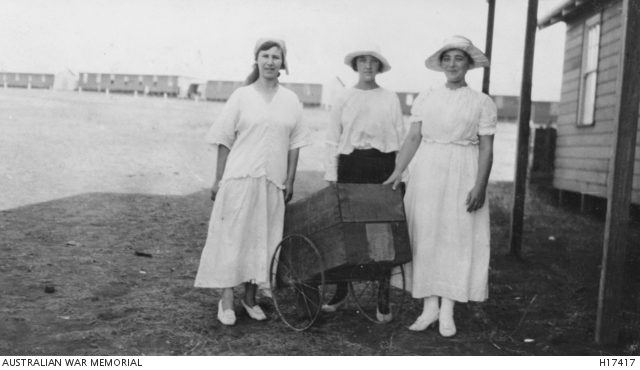“Enemy aliens”
Three Austrian girls wait for their rations at the German Molonglo Internment Camp, Canberra, c. 1918.
It is estimated that over 100,000 Germans were living in Australia when the First World War broke out. They had been migrating since the 1850s, establishing families, businesses, and new lives across the colonies. Despite their contributions to their communities and their loyalty to Australia, many were negatively impacted by the growing anti-German sentiment.
When Britain declared war on Germany, people living in Australia with links to enemy countries, were classified as “enemy aliens”. These enemy aliens included naturalised British subjects born in enemy countries, Australian-born descendants of migrants born in enemy countries, and others who were thought to pose a threat to Australia’s security.
Approximately 7,000 people were interned in Australia during the war, including 4,500 enemy aliens with German or Austro-Hungarian heritage.
1. Explore the following sources, before answering the questions below:
- Migration Heritage Centre website
- Article from “The Conversation”
- Photos from the Australian War Memorial
- Film from the Australian War Memorial
- National Archives of Australia website
a. What does it mean to be interned?
b. How is an internee different to a prisoner of war?
c. Find the locations of some of the camps around Australia, and investigate the camp conditions.
d. What happened to the internees when the war ended?
e. Could women and children be interned?
f. What do you think about the internment of civilians during times of war?
Children and teachers of the school at the German Molonglo internment camp, Canberra, c 1918.
2. Not all Australians of German heritage were interned, and some German migrants and their descendants served with the Australian Imperial Force. Read the case studies of Adolphus Schmahl, Eric Ernest von Bibra, and George and Herbert Heinecke.
a. Discuss the home front and service experiences of the men. What challenges did they face due to their German heritage?
b. For those who returned home, did their service have a positive impact on their place in society? Use examples from the case studies to support your opinions.
c. These men saw action against Germany in Europe. What do you think it would have been like for them to fight against the nation that was home to their ancestors?
d. Why do you think they wanted to serve for Australia?
e. How did Australian society respond to men who chose not to enlist during the First World War?
f. Do you think this response differed for those born in Australia and those born overseas? The following sources may assist:

